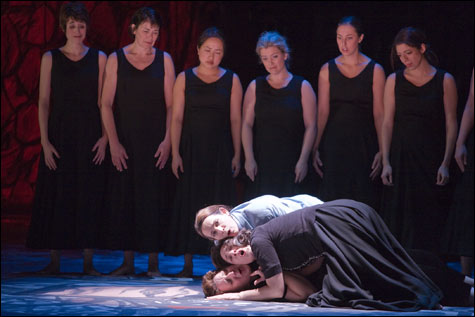
AINADAMAR: More hagiography than opera — but at least it’s new. |
Is it possible for a work of art to seem both completely sincere in its intentions and at the same time counterfeit and manipulative? Puccini built a major career on these contradictions. But people care about him, even admire him, because he did it both so shamelessly and so skillfully. How can you complain about a composer whose music is so relentlessly memorable, even — maybe especially — at its most saccharine? These issues were raised for me at Opera Boston’s Boston premiere of Osvaldo Golijov’s Ainadamar (“The Fountain of Tears”). Boston must be craving new work — all three performances of Ainadamar were sold out well before it opened. Golijov is hot right now, and so are Peter Sellars, who came in to do the staging (he’d staged this before for the Santa Fe Opera), and soprano Dawn Upshaw, who repeated her starring role.
The story is promising. As a child, the great Spanish poet and playwright Federico García Lorca fell in love with the image of Mariana Pineda, a Spanish heroine martyred in 1831 for her refusal to name the men who were fighting for liberation from a repressive monarchy. García Lorca based his third play on her. He had a hard time getting it produced, but a powerful actress, Margarita Xirgu, got it done and played the lead. She too ran into trouble with a repressive regime and tried to get García Lorca to leave Spain and go with her to Havana. He refused, and in 1936, at the age of 38, he became one of the early victims of Franco’s Falangists. Xirgu remained haunted by him and spent the rest of her life devoting herself to his work. It could make a good play — or libretto.
But Golijov’s piece, with a libretto by the playwright David Henry Hwang (M. Butterfly, three Philip Glass operas, and the books to the musical version of Disney’s Tarzan and Elton John’s Aida), is more Passion or pageant than opera. It’s really a series of long solo and choral laments (for Pineda, for García Lorca, for Xirgu), with Big Statements and very little personal or dramatic interaction. The characters are generalizations. There’s hardly any reference, for example, to García Lorca’s homosexuality, or Xirgu’s — in the opera they have a rather misleading love scene. Xirgu sees García Lorca as a Christ figure (“Up the hillside you carried your cross”), and Golijov scores Xirgu’s death at the end as a kind of transfiguration. These religious suggestions — sainthood, martyrdom, beatification — feel vastly overstated. Xirgu is in effect canonized for putting on and acting in García Lorca plays in Latin America. Noble of her, yes, and perspicacious, but saintly?
It appears that the García Lorca estate granted one-time permission to quote him (for the premiere at Tanglewood in 2003) but refused or asked too much for later permission. Hwang’s libretto, in Spanish, could use some real poetry; it’s awash in pompous pronouncements and embarrassing banalities: “My eyes are dry because I have wept a river of tears”; “How tragic when young flesh is mangled”; “All she wanted was love”; “The only things you loved were poetry and freedom”; “I am the fountain from which you drink.” “There is no God,” sings the matador who is assassinated with García Lorca, “there is only the bull.”